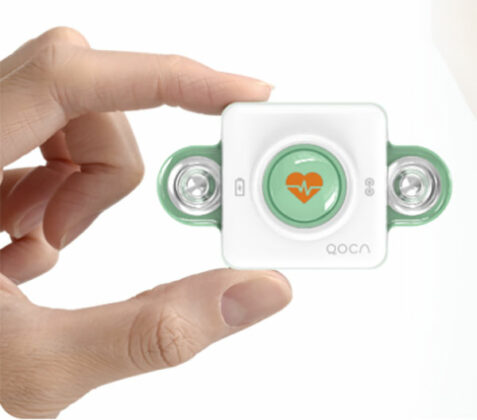Doctor AI? Taiwan’s tech giants make a push into smart healthcare
By Cathy Rose A. Garcia, Editor-in-Chief
TAIPEI — Imagine having to undergo an electrocardiogram (ECG) test for 14 days, but instead of wearing a Holter monitor, you simply attach a small device to your chest with a disposable body patch.
Or maybe imagine a doctor using artificial intelligence (AI) assisted diagnostic software that can scan images of your eyes and quickly detect signs of damage.
These are some of the next-generation, patient-friendly and AI-integrated healthcare innovations developed by Taiwan’s top tech companies Quanta Computer and Acer Medical.
Quanta has developed the QOCA Portable ECG Monitoring Device, a lightweight and compact device that can be used at the hospital or at home.
Acer Medical has come out with VeriSee, an AI-powered diagnostic software solution that is designed to assist doctors with the diagnosis of diabetic retinopathy and other eye conditions.
Both companies are making a push in digital healthcare at a time when Taiwan is facing an increasingly aging population and declining birth rates.
Taiwan is looking to leverage its strength in information and communication technology and AI to ensure it becomes a key player in the global healthcare market. Its government has made digital healthcare a key part of its national industrial policy and identified it as a key application area for AI.
Taiwan’s AI healthcare market is forecast to grow to 1.12 billion New Taiwan dollars (NT$) by 2030, from NT$360 billion in 2023, according to DigiTimes Research.
QUANTA
Quanta Computer is the world’s largest computer original design manufacturer (ODM) and laptop computer maker, but it is increasingly expanding into sectors such as smart healthcare to drive future growth.
Dr. Ted Chang, chief technology officer at Quanta Computer, said healthcare has become a critical global issue especially during the coronavirus disease 2019 (COVID-19) pandemic.
“We tried to make sure that we can put some very important efforts on enabling or advancing AI for the future of healthcare and medicine,” he said during a briefing with foreign journalists at the Quanta headquarters in Taoyuan City in July.
Quanta has introduced QOCA (Quanta Omni-Care with AI) solutions, which allow healthcare providers to accelerate digital transformation.
“What we tried to do is to connect precision medicine, personalized medicine and predictive medicine to the technology. The AI is simply to convert the data to AI but we also need to connect hospital to hospital, and hospital to the home so we created a different kind of platform to support different kinds of medical needs,” Mr. Chang said.
QOCA also has a no-code AI Medical cloud platform, which allows users to build medical AI models.
Mr. Chang also personally demonstrated the use of several QOCA wearable devices such as ECG monitors, digital stethoscopes, pulse oximeters and body temperature monitors. These devices are connected to an app where medical professionals can conduct real-time health monitoring for patients, whether at home or in the hospital.
Mr. Chang said these QOCA solutions are being used in over 70 hospitals in Taiwan, especially in areas where medical care and access are limited.
“This is the future, and the good thing is that more and more (countries) are interested,” he said.
The Quanta executive, who is also one of Taiwan’s representatives for the APEC Business Advisory Council (ABAC), said he would want to share these healthcare innovations with the rest of the Asia-Pacific Economic Cooperation (APEC) members.
“I wish to create a whole new health network… The reason why we enabled these connected health and devices is simply trying to bring more of these advanced health and medical solutions across the border,” he said.
Mr. Chang said the Philippines is interested in tapping some of these solutions.
“The Philippines is also talking to us about the possibility to connect… The challenge is regulation, not technology. Technology is ready,” he said.
ACER MEDICAL
Acer Medical, a unit of Taiwanese giant Acer, is at the forefront of advancing global healthcare through AI innovation.
“Acer Medical’s mission is to make AI work for the core needs of humanity by applying AI in healthcare,” Acer Medical Chairman and Chief Executive Officer Allen Lien said during a briefing for foreign journalists at the company’s headquarters in New Taipei City.
The company’s strategy involves building trusted AI for real-world healthcare challenges — from prediction and clinical communication to real-time care delivery and accelerating therapeutic innovation. It focuses on AI, medical imaging and preventive medicine.
“We are one of the most experienced in introducing AI into healthcare system,” Mr. Lien said, noting that out of Taiwan’s nearly 500 healthcare facilities, around 80 use Acer Medical’s AI software.
One of its key solutions is VeriSee DR, an AI-assisted diagnostic software for diabetic retinopathy. It has received approval in the Philippines, Thailand and Indonesia.
“In the northeast of Thailand, a doctor said she had to see around 200 patients for screening for diabetes. By deploying our AI, we can ease the doctor’s load by half so she can actually focus on the patients,” Mr. Lien said.
Another is the VeriOsteo OP, an AI-assisted screening software for bone mineral density (BMD) abnormality. This has already been approved in Indonesia.
“With this AI, you can just throw in the chest X-ray image, and with the algorithm, it can tell you whether you have osteoporosis,” he said.
Mr. Lien said he does not see AI as replacing doctors, but more of assisting them in the diagnosis.
“I would advocate always having a, what we call it, human in the loop… It’s better that (there’s a) doctor plus a doctor assistant AI instead of AI alone… AI becomes another set of eyes that helps (doctors) double check,” he said.
AI-driven tools can also help ease the workload of healthcare professionals amid a current shortage of workers. These tools can help optimize the allocation of resources and improve the speed of diagnosis.
“The overloaded healthcare system is just going to be there. Whatever number of doctors are created every year, you are just going to have more work waiting for them since the whole world is moving towards an aging society and super aging society,” Mr. Lien said.
“No matter how much work is being replaced by AI, we are still going to see our doctors and nurses being very busy.”
On the issue of data privacy, Mr. Lien said the AI-assisted software does not upload any of the images into the cloud.
“You don’t need to put (the images) in the cloud that jeopardizes the patient’s safety and the patient privacy… There’s no patient image or information needed to be uploaded anywhere,” he said.





